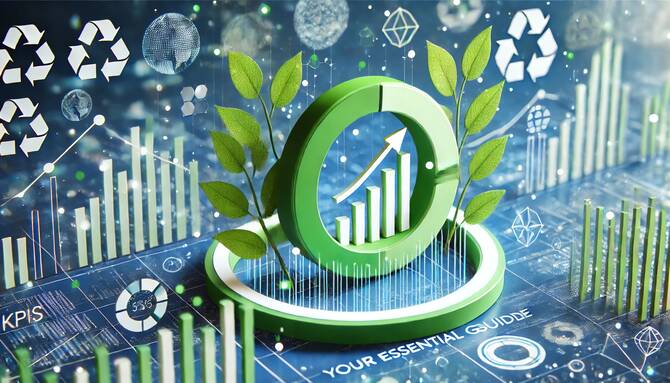Sustainability Metrics and KPIs for Business: Your Essential Guide
Sustainability Metrics and KPIs for Business: In today’s marketplace, companies are measuring sustainability KPIs to achieve long-term environmental goals. They focus not only on traditional business KPIs but also on those related to the environment, society, and governance. This focus is essential for reporting Environmental, Social, and Governance (ESG) goals accurately. Companies do this to grow faster, reach higher values, and cut costs through sustainable methods.
This practice reduces risks, supports long-term strategies, and helps adapt to global changes. Sustainable business efforts clear the path for a prosperous future. Imperative to this monitoring is the focus on a company’s impact on the planet and society. This includes observing carbon emissions and energy usage. It also involves tracking water consumption, waste output, and efforts to protect biodiversity. Such measurements help organisations spot areas needing improvement, meet legal standards, and stay ahead in their fields.
Key Takeaways
- Sustainability metrics and KPIs are vital for checking a business’s environmental and social effects.
- Examining carbon emissions, energy use, and other metrics allows organisations to gauge their sustainability.
- This practice helps companies enhance their operations, meet standards, and stand out from competitors. * Over three-quarters of companies globally use ESG metrics in determining executive compensation, showing the rising value of sustainability in business.
- It’s wise for firms to regularly review their ESG KPIs to stay relevant amidst market changes and meet stakeholder expectations.
Why Measuring Sustainability KPIs is Crucial for Businesses
In the fast-changing business world, tracking sustainability key performance indicators (KPIs) is vital for ongoing success. These KPIs shed light on a company’s environmental, social, and governance (ESG) achievements. This insight helps organisations to make choices that support growth and reduce their environmental impact.
Through KPI monitoring, companies become more transparent, manage risks better, and increase their efficiency. They also meet regulations and stand out in the market.
Monitoring Progress Towards Sustainability Goals
Starting with sustainable goals is key, but it’s equally important to keep an eye on progress. Watching sustainability KPIs shows how well a strategy is working and where improvements are needed.
McKinsey suggests that companies focused on their eco-efforts during purchasing achieve growth quicker, are valued more highly, waste less, and save money. Regular assessments help companies make smart choices, supporting long-term sustainability and business success.
Enhancing Transparency and Communication with Stakeholders
Being open is vital for trust with shareholders like investors, customers, and the public. By measuring and sharing sustainability KPIs, firms prove their dedication to an eco-friendly future. This is supported by the Global Reporting Initiative (GRI) Standard, a tool used by many to track sustainability. Demonstratable commitments attract people who care about the planet, benefiting the company’s image and business performance.
Identifying Areas of Risk and Inefficiency
Sustainability measures highlight risks and inefficiencies within a company. They look at energy use, water, and waste. This can point out problems that lead to extra costs, breaking laws, or harm to reputation.
For example, using too much energy may show there’s waste in production. Companies can fix these issues to do better and save money.
Ensuring Compliance with Regulations
Global authorities are paying more attention to eco-laws. Watching your sustainability KPIs helps your business obey these laws, dodging fines and legal trouble. By looking at your emissions, water use, and waste management, you show you care about the Earth. This builds your reputation and keeps your business running smoothly.
Gaining a Competitive Edge in the Market
Sustainable practices are a big selling point in today’s market. Companies that lead in sustainability often do better than others. This trend is followed by consumers, with many willing to pay extra for green products and services. By showcasing their green progress, companies attract like-minded customers and investors. Doing well in sustainability KPIs helps businesses stand as leaders and secure their future.
Key Sustainability Metrics and KPIs for Business
To effectively gauge sustainability, companies must monitor key metrics and KPIs across ESG aspects. By doing this, they get insights into their journey towards meeting sustainability goals. They also identify areas to improve and foster transparent communication with stakeholders. Below, we dive into vital sustainability metrics and KPIs for businesses.
Carbon Emissions
Understanding carbon emissions is crucial for any business. It shows their impact on the environment and targets for reducing it. Important metrics cover:
- Carbon footprint: Measuring greenhouse gas emissions across Scopes 1, 2, and 3
- Carbon intensity: Quantifying emissions per unit of output or revenue
- Percentage reduction in carbon emissions compared to a baseline year
For instance, Patagonia focuses on tracking CO2 emissions, energy use, waste, and water. They use this data to reduce their environmental impact.
Energy Consumption
Energy tracking assists companies in refining their operations and lessening their environmental damage. Metrics of interest include:
- Total energy usage in kWh
- Energy usage per unit of output or revenue
- Proportion of renewable energy use
The achievement of ISO50001 by Hilton marked a significant energy milestone. It highlights their commitment to monitor and improve energy usage across their properties.
Water Usage
Monitoring water usage is vital for any eco-conscious company. They look at:
- Total water use in metric tons
- Water use per unit of output or revenue
- Ratio of recycled water
For example, Internet Fusion Group employs a water recycling scheme. This initiative allows them to reuse a significant amount of rainwater in their operations.
Waste Generation
Limiting waste and supporting a circular economy is cornerstone for sustainability. Metrics include:
- Total waste production in metric tons
- Rate of waste diversion from landfills
- Approach to managing and reducing hazardous waste
Abel and Cole, a food delivery company, aims to dramatically cut its food waste. Their aim is to only waste 0.8% of the food they buy each month.
Biodiversity Protection
Businesses must also consider biodiversity in their sustainability efforts. Relevant metrics look at:
- Ecological footprint assessment
- Area of land protected or restored
- Species protection or conservation efforts
Recognising this, The Guardian includes biodiversity preservation in its environmental strategies. They engage in restoring habitats and rehabilitating ecosystems.
Social and Governance Metrics
Aside from environmental aspects, social and governance elements are critical. These cover:
- Employee well-being and happiness
- Metrics on diversity, equity, and inclusion (DEI)
- Engagement with local communities and investment in them
- Adherence to industry-specific regulations and policies
These metrics highlight a company’s contribution to their employees, local communities, and society at large. They also ensure the company follows ethical governance standards. With clear sustainability objectives and continuously updating on their performance, companies pave the way for a greener future. This strategy enhances their standing in a market that values environmental and social responsibility.
Conclusion
Today, businesses must measure sustainability metrics and KPIs to succeed long-term. Companies should focus on crucial sustainability measurements like carbon emissions and energy use. This helps find opportunities to save costs and adhere to environmental laws. It’s also important to look at social and governance metrics. This ensures ethical operation and positive community impact. Using these KPIs helps firms stay competitive, appealing to consumers and investors who value ecological and social responsibility.
Summing up, measuring sustainability metrics is crucial for long-term success. It aligns businesses with the critical need for environmental and social care. Through these efforts, companies can become more resilient, innovative, and create value for everyone involved. Although the path to sustainability may be hard, adopting the right metrics and a dedication to improvement can lead to a brighter, greener future.






